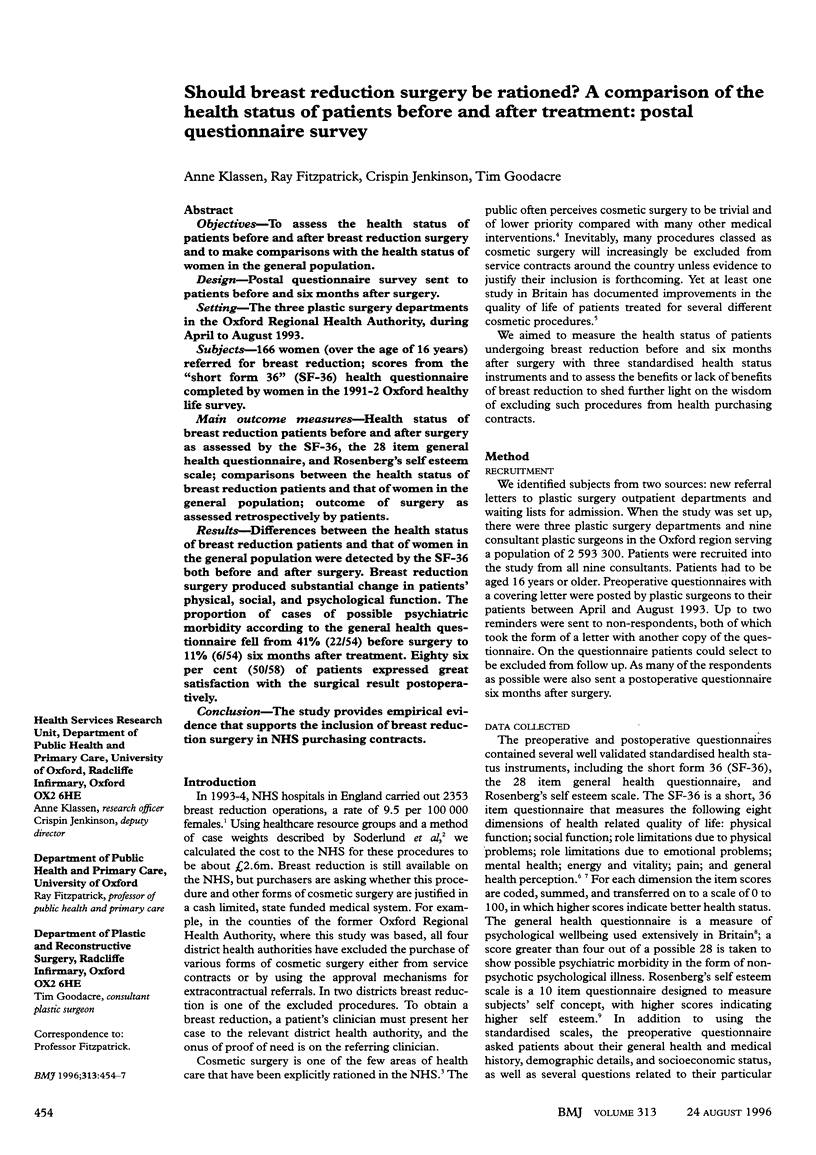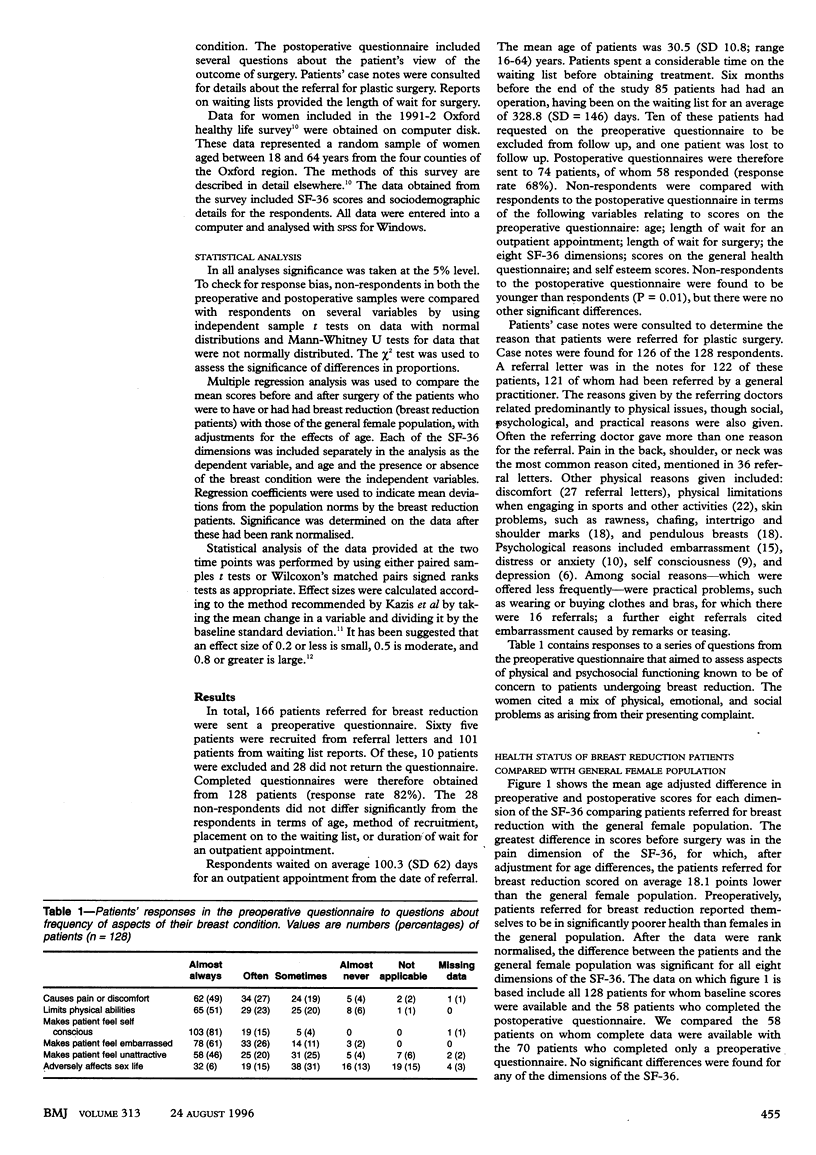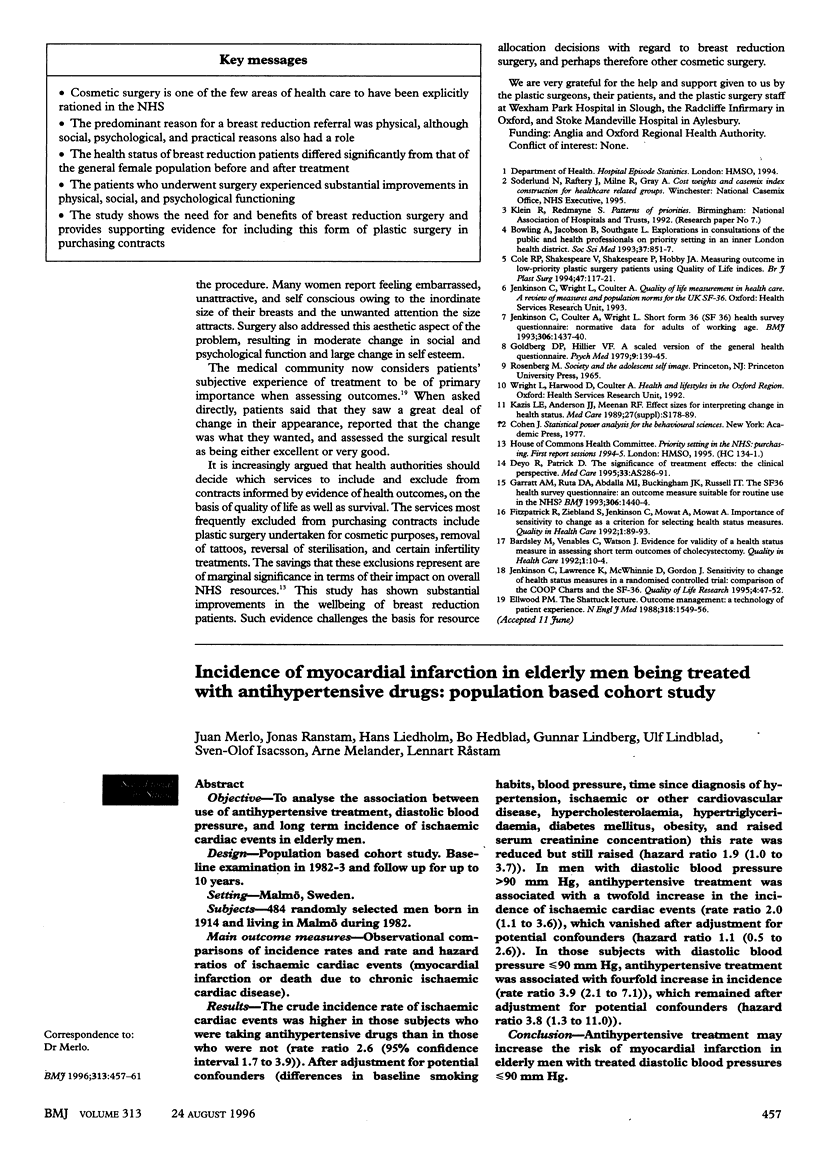Abstract
OBJECTIVES: To assess the health status of patients before and after breast reduction surgery and to make comparisons with the health status of women in the general population. DESIGN: Postal questionnaire survey sent to patients before and six months after surgery. SETTING: The three plastic surgery departments in the Oxford Regional Health Authority, during April to August 1993. SUBJECTS: 166 women (over the age of 16 years) referred for breast reduction; scores from the "short form 36" (SF-36) health questionnaire completed by women in the 1991-2 Oxford healthy life survey. MAIN OUTCOME MEASURES: Health status of breast reduction patients before and after surgery as assessed by the SF-36, the 28 item general health questionnaire, and Rosenberg's self esteem scale; comparisons between the health status of breast reduction patients and that of women in the general population; outcome of surgery as assessed retrospectively by patients. RESULTS: Differences between the health status of breast reduction patients and that of women in the general population were detected by the SF-36 both before and after surgery. Breast reduction surgery produced substantial change in patients' physical, social, and psychological function. The proportion of cases of possible psychiatric morbidity according to the general health questionnaire fell from 41% (22/54) before surgery to 11% (6/54) six months after treatment. Eighty six per cent (50/58) of patients expressed great satisfaction with the surgical result postoperatively. CONCLUSION: The study provides empirical evidence that supports the inclusion of breast reduction surgery in NHS purchasing contracts.
Full text
PDF



Selected References
These references are in PubMed. This may not be the complete list of references from this article.
- Bardsley M. J., Venables C. W., Watson J., Goodfellow J., Wright P. D. Evidence for validity of a health status measure in assessing short term outcomes of cholecystectomy. Qual Health Care. 1992 Mar;1(1):10–14. doi: 10.1136/qshc.1.1.10. [DOI] [PMC free article] [PubMed] [Google Scholar]
- Bowling A., Jacobson B., Southgate L. Explorations in consultation of the public and health professionals on priority setting in an inner London health district. Soc Sci Med. 1993 Oct;37(7):851–857. doi: 10.1016/0277-9536(93)90138-t. [DOI] [PubMed] [Google Scholar]
- Cole R. P., Shakespeare V., Shakespeare P., Hobby J. A. Measuring outcome in low-priority plastic surgery patients using Quality of Life indices. Br J Plast Surg. 1994 Mar;47(2):117–121. doi: 10.1016/0007-1226(94)90170-8. [DOI] [PubMed] [Google Scholar]
- Deyo R. A., Patrick D. L. The significance of treatment effects: the clinical perspective. Med Care. 1995 Apr;33(4 Suppl):AS286–AS291. [PubMed] [Google Scholar]
- Ellwood P. M. Shattuck lecture--outcomes management. A technology of patient experience. N Engl J Med. 1988 Jun 9;318(23):1549–1556. doi: 10.1056/NEJM198806093182327. [DOI] [PubMed] [Google Scholar]
- Fitzpatrick R., Ziebland S., Jenkinson C., Mowat A., Mowat A. Importance of sensitivity to change as a criterion for selecting health status measures. Qual Health Care. 1992 Jun;1(2):89–93. doi: 10.1136/qshc.1.2.89. [DOI] [PMC free article] [PubMed] [Google Scholar]
- Garratt A. M., Ruta D. A., Abdalla M. I., Buckingham J. K., Russell I. T. The SF36 health survey questionnaire: an outcome measure suitable for routine use within the NHS? BMJ. 1993 May 29;306(6890):1440–1444. doi: 10.1136/bmj.306.6890.1440. [DOI] [PMC free article] [PubMed] [Google Scholar]
- Goldberg D. P., Hillier V. F. A scaled version of the General Health Questionnaire. Psychol Med. 1979 Feb;9(1):139–145. doi: 10.1017/s0033291700021644. [DOI] [PubMed] [Google Scholar]
- Jenkinson C., Lawrence K., McWhinnie D., Gordon J. Sensitivity to change of health status measures in a randomized controlled trial: comparison of the COOP charts and the SF-36. Qual Life Res. 1995 Feb;4(1):47–52. doi: 10.1007/BF00434383. [DOI] [PubMed] [Google Scholar]
- Kazis L. E., Anderson J. J., Meenan R. F. Effect sizes for interpreting changes in health status. Med Care. 1989 Mar;27(3 Suppl):S178–S189. doi: 10.1097/00005650-198903001-00015. [DOI] [PubMed] [Google Scholar]


